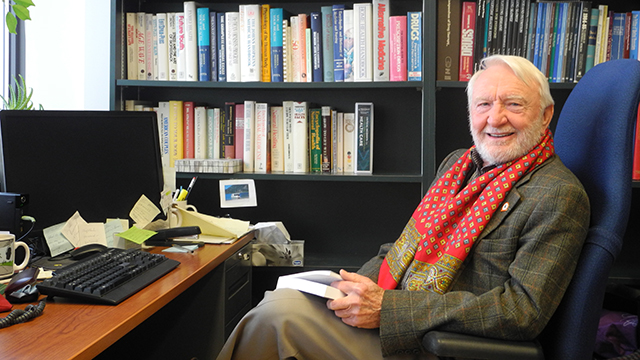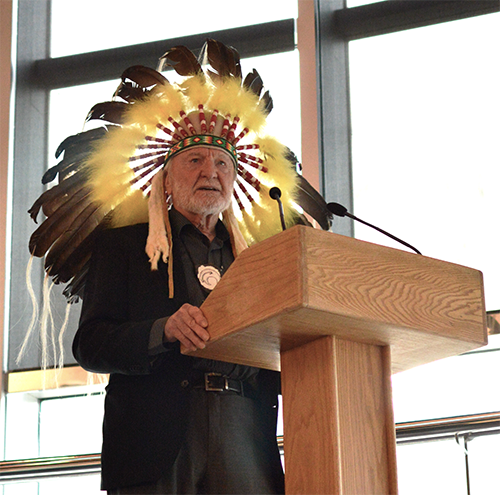
Earle Waugh's career has been an unusual but rewarding journey through different disciplines and cultures.
After 42 years of research, publishing, teaching, and community involvement, most people would be ready to sit back and relax. But for Earle Waugh, now professor emeritus with the Department of Family Medicine in the Faculty of Medicine & Dentistry, the beginning of 2017 marks not only a second retirement, but also the search for the newest challenge in a lifetime full of adventures.
Waugh began life in rural Saskatchewan, leaving as a young man to pursue his undergraduate and master's degrees at McMaster University. He was eventually courted by the University of Chicago's School of Divinity to work in the history of religions program. At the time, most religious studies programs viewed religion from a cultural perspective, and Waugh was in the right place to witness the seismic cultural shifts of the 1960s including the development of cults culture and the rise of Black Muslims in Chicago. Waugh recalls, "I developed a feel for the way in which religion seeps into every aspect of culture and plays a role, sometimes a very hidden role in directing the way that people respond to issues and crises and problems without clashes, without conflicts of major sorts."
Despite the growing popularity of studying Hinduism or Buddhism, two Eastern religious traditions introduced to the masses by a little band called the Beatles, Waugh favoured Islam when the time came for him to select one great religious tradition on which to focus his research. Although his thesis supervisor, Mircea Eliade, expressed misgivings about his selection, Waugh remained faithful to his choice. He recognized Muslim culture as understudied and believed in the need for balance in teaching religious traditions. Although his primary focus was Islam, he had been intrigued by Eliade's beliefs about Indigenous traditions and studied them as well.
Waugh joined the University of Alberta in 1974 as chair of the Department of Religious Studies in the Faculty of Arts. He was struck by the impact of both Muslim and Indigenous cultures on the province, and subsequently worked to mainstream their study. He published books about Muslim Culture, The Muslim Community in North America and Muslim Families in North America, and was involved in organizing conferences about Muslim and Indigenous cultures.
Early in his time as chair of religious studies, he organized an international conference on native religious studies. Following the conference, a Cree nun named Sister Nancy LeClaire approached him for assistance in creating a Cree language dictionary. Of their collaboration, Waugh explains: "We only got to the letter N and she called me to her hospital bed and she said 'Now Dr. Waugh you have to finish my dictionary project. I said, 'But Sister Nancy, first of all that will take an awful lot of money and an awful lot of work' and she said 'That's alright; I want you to do it and my Powikan will sit on your shoulder until you're finished.'"
That spirit remained on Waugh's shoulder for 27 years as he continued to work with elders from the Cree community until, in what he has described as a highlight of his career, the Alberta Elders Cree dictionary was published in 1998. The dictionary sold out in one day and was named the Alberta Scholarly Title of the year by the Alberta book Awards in 1999.
Books by Earle Waugh
Memory, Music and Religion
The Munshidin of Egypt
Dissonant worlds
The Elders Cree dictionary
At the interface of culture and medicine
The Muslim Community in North America
Muslim Families in North America
Cultural competencies (x2)
Idioms of Sami Health and Healing
Visionaries of Silence: The Reformist Sufi Order of the Demirdashiya al-Khalwatiya in Cairo
The relationship built with Alberta's Cree community during work on the book resulted in Waugh being bestowed the name, Piwapisk-omostos, which means Iron Bull, and he was given a ceremonial headdress in honour of his dedication to the Cree community.
Waugh's academic background and work with the medical community may seem mismatched, but he says it was a very natural progression from his earlier work with a small Anthropology-based research group, the Centre for the Cross-cultural Study of Health and Healing. The multidisciplinary nature of the centre's work revealed to him an unrecognized relationship between arts, sciences and medicine.
"I was very much interested in medicine and in the way that the values of medicine have what I would call 'tracked' culture. So cultures in a way define what health means, and in some ways religious values inform what we expect health to mean and wellness to mean," Waugh explains.
He wished to formalize the centre with a foot in medicine and a foot in arts and sciences but was thwarted by university policy at that time which mandated retirement at 65.
By 2002, Waugh was facing retirement but still actively playing hockey with a university team, The Stone Angels. A conversation between Waugh and teammate Rick Spooner, then-chair of the Department of Family Medicine, resulted in mutual agreement about the benefits of family physicians understanding the different perspectives on medicine held by cultural groups. Waugh's career went from being put on ice to having a second wind when Spooner brought the Centre for the Study of Intercultural Health and Healing, now the Centre for Health and Culture, to the Department of Family Medicine in 2003.
"It's been a wonder ful eye-opener to see how much medicine has changed and become much more aware of the things I have wished for."
ful eye-opener to see how much medicine has changed and become much more aware of the things I have wished for."
Waugh's work and collaborations in family medicine, notably with Jean Triscott and Olga Szafran, resulted in numerous publications focused on the relationship between health and culture, including At the Interface of Health and Medicine and the Cultural Competencies for Healthcare Professionals series. His commitment to increasing cultural awareness to health care professionals resulted in his receiving of the 2010 Friend of Pharmacy Award from the Alberta College of Pharmacists. Waugh has continued writing including forthcoming books, Women in Medicine, a collaboration with Shirley Schipper and Shelley Ross, and A History of Edmonton's Al Rashid Mosque.
On November 7, 2016 representatives from Alberta's Cree community, members of Edmonton's Al Rashid Mosque, Aboriginal students, family physicians and university faculty and staff gathered at the Timms Centre to witness the transfer of the ceremonial Cree headdress Waugh was given to permanent loan at the University of Alberta; a lasting reminder of a career marked by a deep commitment to encouraging learning and understanding culture.
For almost as long as there's been a Canada, there's been a University of Alberta. Over the next year, in honour of Canada's 150th anniversary, we're proudly celebrating the people, achievements and ideas that contributed to the making of a confederation.
